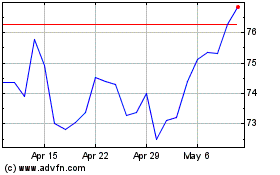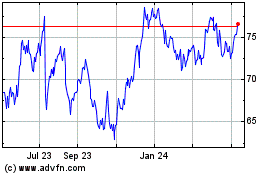Financial Winners In Senate Bill Were Those Dodging The Bullets
May 21 2010 - 12:45PM
Dow Jones News
The winners after the U.S. Senate passed financial overhaul
legislation are the industries that managed to avoid being
losers.
Insurers, hedge funds, derivatives exchanges and money managers
avoided most of the worst of the Senate's sweeping proposals, which
were approved late Thursday.
For big banks, regional banks and consumer lenders, not so
much.
"This is not some bump in the road where we go back to business
as usual in six months," said attorney Douglas Landy, head of U.S.
banking practice at Allen & Overy. "This is a very fundamental
change in the way U.S. banks operate, from raising capital to how
they operate and what they invest in."
To become law, the Senate's provisions must be reconciled with
the House of Representative's financial overhaul legislation passed
in December.
By contrast to the fallout for banks, the Senate bill's various
provisions imply small, even incremental, changes for insurance
companies, independent hedge funds and mutual funds--in part
because most policymakers don't blame them for causing the
crisis.
There could be some big changes for hedge funds, for
example--that is, those owned by banks. A key element of the Senate
bill, known as the Volcker Rule after former Fed chief Paul
Volcker, restricts banks from investing in or sponsoring hedge
funds. A relatively light consequence for hedge funds broadly is
that those with more than $100 million must register with the
Securities and Exchange Commission as investment advisers and
report their trades and portfolios to the agency.
If the Volcker Rule ends up becoming law, it could be a boon for
standalone funds. They would face less competition from bank-owned
funds; moreover, the investor bases of those bank-owned funds could
get spooked and flock to other funds. The Senate's light touch on
hedge funds reflects an about-face from the Wall Street crisis of
1998, when hedge fund Long Term Capital Management, rather than a
bank, threatened to sink financial markets worldwide.
The insurance industry avoids any major hits should the Senate's
bill become law. The Senate bill establishes a federal Office of
National Insurance, which insurers have long favored, and which
would advise the president and Congress on insurance issues and
play a key role in international agreements.
Mutual funds also escaped hefty rule changes. Even though many
mutual fund investors suffered losses when markets careened during
the crisis, money managers were rarely considered responsible in
causing it. The industry found further cover when the newly seated
Sen. Scott Brown (D., Mass.) explicitly worked to shield his
state's mutual-fund companies--including Fidelity Investments and
State Street Corp. (STT)--from the bill's provisions.
One clear winner could be the derivatives exchange operators CME
Group Inc. (CME) and IntercontinentalExchange Inc. (ICE), which
operate clearinghouses where companies could be forced to clear
their derivatives trades.
Banks and consumer lenders, by contrast, found far less help
from the Senate ranks as lawmakers finalized the bill.
Although Republicans worked to defeat even more restrictive
Volcker Rule language, banks could face strong curbs on the "swipe"
fees they charge to businesses who accept debit cards. Consumer
lenders could also be forced to deal with regulations from an
independent Consumer Financial Protection agency, which both the
House and Senate bills propose.
Moreover, a strong provision by Arkansas Sen. Blanche Lincoln, a
Democrat--which shocked some observers by surviving Senate
horse-trading, despite opposition from government officials--would
make it nearly impossible for Wall Street banks to keep their
lucrative derivatives units. Some observers still expect this
provision to eventually be watered down or removed.
The Senate bill could also force some banks to go through
changes in their capital. Some trust preferred shares might no
longer contribute to key bank capital ratios, which might require
tough negotiations between banks and investors in these shares over
their eventual fate.
The restrictions on capital, coupled with the bill's various
other measures, could mean jarring changes for banks and their
investors.
Said Steve McBee of lobbyist firm McBee Strategic Consulting:
"Senate passage yesterday of financial regulatory reform means the
most sweeping reform of our financial system is one step closer to
enactment."
-By Marshall Eckblad and Erik Holm, Dow Jones Newswires;
212-416-2156; marshall.eckblad@dowjones.com
(Jacob Bunge in Chicago and Joseph Checkler in New York
contributed to this report.)
State Street (NYSE:STT)
Historical Stock Chart
From May 2024 to Jun 2024

State Street (NYSE:STT)
Historical Stock Chart
From Jun 2023 to Jun 2024
